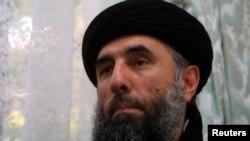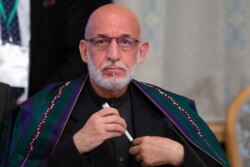ISLAMABAD — A key presidential candidate in Afghanistan urged President Donald Trump on Friday to test the U.S. military power against Russia instead of threatening the "oppressed" Afghans.
Politicians and the public in the war-ravaged country continue to express their anger at Trump for claiming his military plan, if executed, could win the Afghan war within 10 days, killing 10 million people and wiping Afghanistan "off the face of the Earth."
Gulbuddin Hekmatyar, a presidential hopeful and former anti-American warlord, denounced Trump's assertions while addressing thousands of his supporters in Kabul. The crowd of fewer than 10,000 chanted "Death to America, Death to Trump" during the speech.
"We ask Mr. Trump that if you have the courage and strength, and you believe in your military power, then test it against [Russian President Vladimir] Putin, and not the oppressed Afghans," Hekmatyar said.
"The same Putin who is said to have meddled in America's election, enabling you [Trump] to reach the White House to become the president," Hekmatyar went on to mock Trump.
Ghani government criticized
He also criticized President Ashraf Ghani's coalition government for seeking "clarification" from Washington rather than denouncing Trump's remarks. Hekmatyar and his fighters fought alongside the Taliban against U.S. and NATO forces until two years ago, when he entered into a peace-and-reconciliation deal with the U.S.-backed government in Kabul.
Trump, while speaking Monday to reporters at the White House together with Pakistani Prime Minister Imran Khan, explained why he needed Islamabad's help "to extricate ourselves" from Afghanistan.
"I have plans on Afghanistan that, if I wanted to win that war, Afghanistan would be wiped off the face of the Earth. It would be gone. It would be over in, literally, in 10 days. And I don't want to do — I don't want to go that route," Trump remarked.
Most Afghan presidential candidates and former President Hamid Karzai also have slammed Trump for his controversial statement. Karzai told VOA the American president's statement came from a "criminal mindset" and showed "contempt" toward Afghanistan and the Afghan people.
Hekmatyar, who heads his Hezb-e Islami political group, called for all Afghan stakeholders to accept "all reasonable" demands by the Taliban for ending the war.
"Foreigners and the government they have installed [in Afghanistan] must both accept their [Taliban's] demands. ... Hezb-e-Islami is determined not to compromise on peace, and if we are forced, we will alone find a settlement with the Taliban," Hekmatyar cautioned.
The United States is engaged in direct talks with the Taliban, and they are said to have come close to signing a peace deal.
The insurgents say they are seeking a troop withdrawal timetable from Washington in exchange for assurances that Taliban-controlled areas will not become a sanctuary for international terrorist groups. U.S. officials, however, say a final agreement also would require the Taliban to engage in intra-Afghan peace negotiations, including representatives of the Kabul government.
The insurgent group remains strongly opposed to any talks with the Ghani government, dismissing it as illegitimate and a U.S. puppet.
Defense of U.S. efforts
When asked for her comments about Afghan outrage over Trump's remarks, State Department spokeswoman Morgan Ortagus said Thursday that she would remind Afghans about the large number of troops from the U.S. and NATO allies who have been killed in Afghanistan.
"Not just the number of lives lost but the billions of dollars that have spent there. ... So I think that the people of Afghanistan should know that for almost 20 years, Americans have lost their lives and have spent their hard-earned taxpayer money to see the people of Afghanistan have a choice for their own future," Morgan told reporters.
"And that commitment has not been a small commitment. That has been a vast and sweeping commitment by the American people," she emphasized.
The conflict aimed at stabilizing Afghanistan — the United States’ longest foreign military intervention — has cost Washington an estimated $1 trillion and more than 2,400 lives.
The U.S. is still paying about $4 billion annually to Kabul, mostly for salaries and training of Afghan security forces battling the Taliban.

